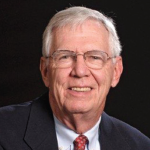
Dr. Anderson
Dr. Anderson: It was a different world when I began my career as training program director at the Brigham in 1971. At that time, there were subspecialty boards in only three areas: cardiology, gastroenterology and pulmonary diseases. The position of a hospital-based, full-time clinician teacher in any of the medical disciplines essentially did not exist.
Physicians chose to train in such fields as rheumatology, endocrinology and oncology not to obtain board certification, but primarily because of an interest in the underlying science and clinical challenge of these disciplines. It has been suggested that the most positive impact of the discovery of the rheumatoid factor in the 1940s was that it attracted immunologists to the study of rheumatic diseases.
Over the course of a career in the practice of medicine, one becomes aware that many of the facts learned, conditions treated and clinical skills previously acquired are no longer applicable—or even employed in the current care of patients. At one time I was proficient in the nuances associated with the use of digitalis, mercurial diuretics and injectable gold. Fortunately, these talents are no longer needed.
Technology changes, but patients remain the same. I am convinced that the skills and techniques used in obtaining and interpreting the patient’s history, performing a
physical exam and interacting effectively with both patients and colleagues remain unchanged and are essential to the education of young physicians, as is the creation of an environment that is stimulating, interactive and supportive.
Participation in an investigational activity should be included in the training process, especially for those with no long-term plans to develop as an independent investigator. This experience enables one to evaluate new information in a critical fashion, improve their ability to teach and also interact with investigators at various levels throughout their careers.
TR: What do you believe are the essentials in interacting with patients?
Dr. Anderson: The primary goal of the initial encounter with a patient is the creation of an atmosphere of trust and an acquisition of an understanding of the unique individual and medical characteristics of the patient. There are three pieces of data that seem essential to obtain either at the first visit or shortly thereafter:
1. What is their support system? Who are they responsible for, and who is there to support them?
2. What is unique and special about the patient? What are they famous for?
3. What have they been successful in during their life, and/or how have they dealt with adversity?
Time spent in forming this relationship is cost effective by any criteria. It will serve both parties well, particularly in dealing with the difficult times that undoubtedly will occur in the course of continuing care. As a result of understanding their unique needs, strengths and past experience with adversity, the use of extraneous laboratory tests and imaging studies obtained solely for reassurance can be reduced and the patient is more likely to comprehend and follow instructions. Less time and effort are spent on attempting to convince the patients of your competence.
TR: How does one deal with uncertainty?
Dr. Anderson: It is not always necessary to make a diagnosis at the end of the visit. Many rheumatological presentations will get better spontaneously and are diagnoses of exclusion.
Remember that the great body of medical knowledge is based on conditions that don’t get better. When uncertainty exists, the approach of initially considering and excluding, as best as one can, the worst-case scenarios is often appropriate. It is good to understand that once you make a diagnosis, you may stop thinking. Patients tend to benefit from an uncertain, yet questioning, physician.
If a program of ‘wait and see’ is chosen, think out loud, discuss it with the patient, and make certain they agree. Avoid the tendency, often requested by the patient or their family, to intervene with imaging studies, further bloodwork or trials of therapy. It is in situations such as this that the initial establishment of a mutually trusting relationship pays off.



